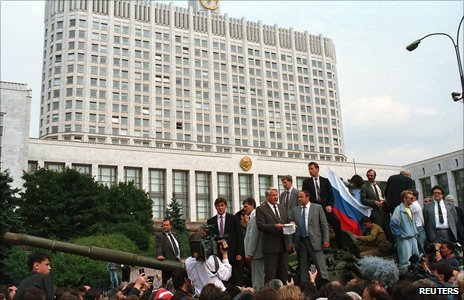
http://www.bbc.co.uk/news/world-europe-14589691
It is one of the abiding images of modern Russian history, the famous picture of Boris Yeltsin speaking on a tank outside the parliament in Moscow on 19 August 1991. It was a moment when the future of the Soviet Union hung in the balance. That morning a group of communist hardliners had staged a coup against Mikhail Gorbachev's reforms. The Soviet leader was trapped in Crimea, and troops and tanks were on the streets of Moscow. Mikhail Arutyunov (second right) left the White House with Boris Yeltsin to meet the tanks
It seemed like the era of glasnost and perestroika was at an end.
But a determined group of democrats had gathered at the Russian parliament, which became the rallying point over the next three days. It is an imposing building on a bend in the Moscow River, and that August it became known as the "White House."
Boris Yeltsin, the new President of the Russian Soviet Socialist Federal Republic, was about to have his finest hour.
Moral dilemma
Also in the White House that morning was Mikhail Arutyunov. He is a scientist who had developed an interest in human rights in the 1980s. Like many people in those heady years he had then somehow fallen into politics, and was now a deputy in the Russian parliament.
"I was near Yeltsin in the White House that morning," he remembers. "He decided to go out and meet the tanks. He beckoned to me and said "Let's go!", and we went down. He climbed up onto a tank and he made the famous speech."
Although it was unclear to many at the time how things were going to turn out he insists that fear was not a factor that morning.
"We weren't afraid. We were certain that we were going to win - that we were right and we were going to win."
In the photographs and television pictures from the day Mikhail Arutyunov can be seen standing on the tank behind Boris Yeltsin looking slightly bemused, one of a motley collection of bodyguards, politicians and protesters who dared to believe they could beat the system that had run Russia since 1917.
At that moment one of the commanders of the same squadron of tanks was wrestling with the kind of moral dilemma that no military officer ever wants to face - whether to obey his orders, or go against them and do what he believed to be right.
Sergey Yevdokimov had been woken at his barracks soon after midnight, and was ordered to lead his tanks into Moscow. Unaware of exactly what was going on, he nonetheless made himself a secret promise as he rolled down the wide avenue into the capital to hurt no-one.
Tank commander Major Sergey Yevdokimov: 'I decided that whatever order I was given, I wouldn't shoot'
He parked his tanks on the river just across from the White House, and was then ordered to drive them over the bridge and position them outside the parliament itself.
Once there he struck up a conversation with one of the demonstrators, a businessman called Sergey Bratchikov.
"He scrambled up on to my tank and asked me this question. 'Are you going to shoot at us? Or maybe you'd rather come over to our side and start defending the parliament?'"
Anger
Sergey Yevdokimov was worried that the businessman might be from the KGB, but was persuaded to go into the White House and talk to some of the senior deputies inside.
When he came down he ordered his men to encircle the parliament, and turn their tanks round so that the guns were pointing out, away from the building and towards any potential attack.
The coup took two more days to peter out, but it was those dramatic gestures on the first day that took the wind out of the sails of the hardliners.
After the Soviet Union split up Boris Yeltsin went on to become the president of the new Russian Federation.
Mikhail Arutyunov only stayed in politics for a few more years after 1991. He strongly opposed the first Chechen War, and became utterly disillusioned with the new Russia he had helped to build. He watched, helpless, as oligarchs and corrupt officials replaced Communist Party members as the country's new elite.
"What we have ended up with is what we were fighting against at the time," he says. "The population is separating into the extremely poor and the extremely rich. Unfortunately our people have always been very passive except at critical moments."
He predicts that Russia's days of revolution are not yet over, "I think that what is happening now will eventually lead to another wave of anger."
The tank commander, Sergey Yevdokimov, left the army just as Russia's financial crisis of the 1990s started to bite. Over the next few years he worked his way through a series of low-paid, dead-end security jobs, just managing to keep his head above water.
He has watched the country that he helped give birth to become immeasurably richer on the back of economic liberalisation and high prices for oil and commodities. But he has also seen the ideals that he risked everything for become slowly eroded.
Twenty years on Russia is a democracy of sorts, but the system is deeply flawed, unaccountable and corrupt.
"What I was hoping for back in 1991 didn't ever quite materialise. And that's a shame," he says.
"But life is much better now than it was in the Soviet Union. It's not quite what we expected, but it is better."
No comments:
Post a Comment